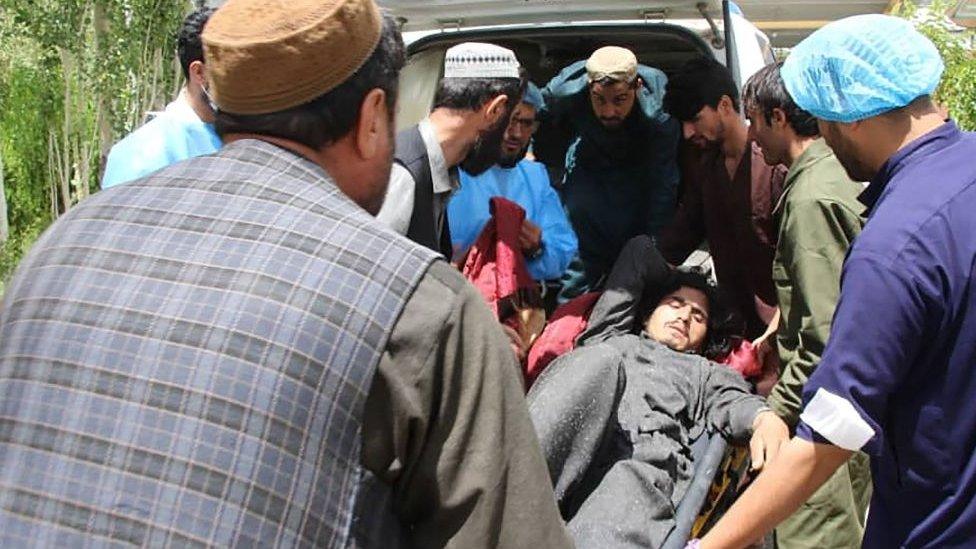Afghanistan earthquake: 'Every street you go you hear mourning'
- Published

The quake hit in a remote, rural area which rescuers face a difficult task just accessing
"A couple of helicopters came to help but it is not clear what else they can do other than moving the dead bodies."
This is how one Afghan described the situation after a powerful earthquake left hundreds dead.
The quake happened in the early hours of the morning, causing houses to collapse and crush people sleeping inside.
Rescuers have in some cases been digging with their bare hands, if they have been able to reach the affected areas at all. Rural eastern Afghanistan is not an easy place to travel to. The toll is expected to grow as the picture becomes clearer.
"It was shortly after 01:30 that the earthquake happened. I was scared. I tried to find my friends. Some of them lost their relatives. Some are ok but their homes are damaged," said Ahmad Nour.
"You can hear the ambulances' sirens everywhere. I talked to people. They are so frustrated. They lost their beloved ones. They are in a miserable situation."
Witnesses at the scene described a desperate situation. "Every street you go, you hear people mourning the deaths of their beloved ones," said one journalist.
Afghan healthcare is already extremely fragile
A photo seen by the BBC shows a young girl - three or four - covered in dust standing in front of a partially collapsed house. She looks dazed and it is not clear what happened to the rest of her family. The BBC is trying to find out more about her wellbeing.
Alem Wafa, 49, travelled to one of the worst-affected parts of Paktika province to help pull out those trapped.
"There are no official aid workers, but people from neighbouring cities and villages came here to rescue people," he said.
"I arrived this morning and I, myself, found 40 dead bodies. Most of them are young, very young children."
Afghans are already facing hardship on several fronts. Poverty is rampant, and the country has endured decades of conflict. When the Taliban took over Afghanistan last year, many countries cut development aid.
Already thinly stretched services are unlikely to be able to cope.
"Doctors and nurses are among the victims," said one doctor from Gayan district in Paktika.
WATCH: Body removed from rubble after deadly earthquake hits Afghanistan
"We didn't have enough people and facilities before the earthquake, and now the earthquake has ruined the little we had. I don't know how many of our colleagues are still alive."
Aid agencies are trying to help but communications and water provisions are adding to the challenge. They are focussing on bringing food, medicine and emergency shelter to those in need.
"We have got our mobile health and nutrition teams in the affected districts giving first aid to those who are injured," said Sam Mort of Unicef.
"We've also got aid trucks on the way with supplies such as hygiene kits and blankets and tents and tarpaulins. Right now it is throwing it down with rain which is complicating the rescue efforts as well."
"And of course this is against a back drop of communities of people who were starving, were poor, were sick, were suffering with the drought," she added.
"This is not a strong and resilient population."
Related topics
- Published15 August 2023